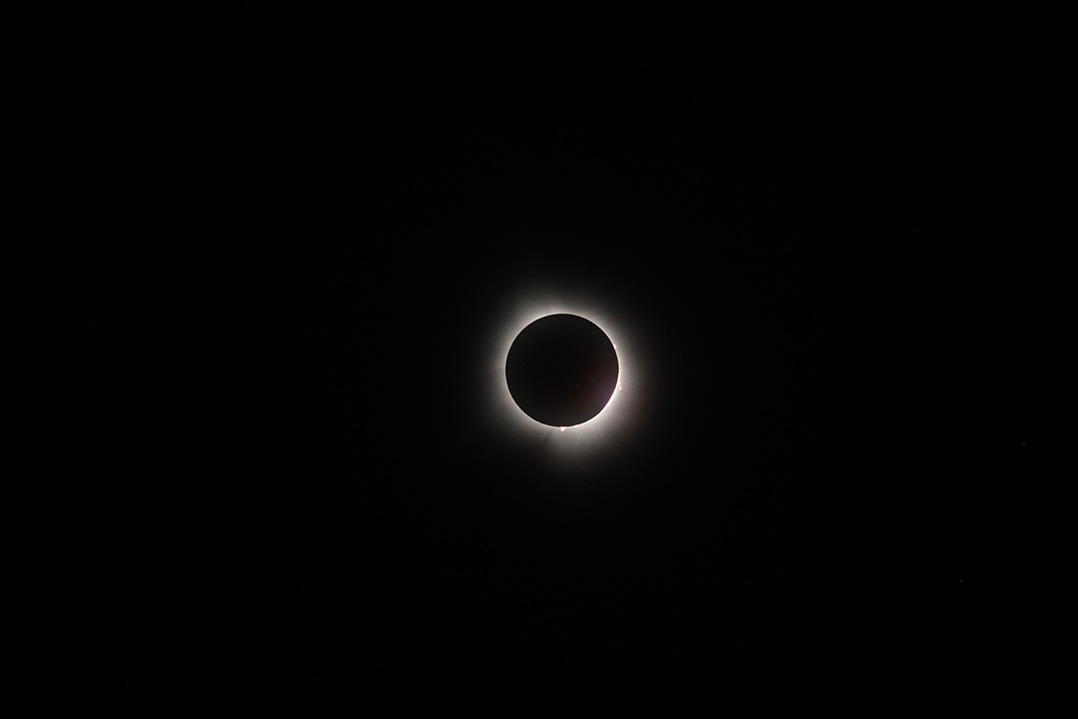Commentary by JR Sandadi
In the vast expanse of the cosmos, certain events stand out as once-in-a-lifetime experiences, captivating our minds and souls with their celestial splendor. Among these cosmic phenomena, the total solar eclipse reigns supreme, a breathtaking display of nature’s grandeur that leaves observers in awe of the universe’s majesty.
As the recent solar eclipse graced the sky April 8, we gathered eagerly in our backyard, blessed with perfect weather and a clear view. The anticipation was palpable as the celestial dance began. Our excitement peaked as the mesmerizing spectacle unfolded, with the moon gradually obscuring the radiant face of the sun with the partial solar eclipse starting around 1:56 p.m. In that moment, we felt connected to ancient wisdom and profound symbolism, reminded of the eternal interplay of cosmic forces and the intricate interconnectedness of all life.
As totality time of 3:06 p.m. approached, anticipation surged in Carmel. Among a group of sky watchers, we observed the moon slowly covering the radiant glow of the sun. The atmosphere crackled with excitement as daylight gave way to an eerie darkness, casting shadows that danced across the landscape in a surreal display. When the moment arrived, it was unforgettable. Though fleeting, lasting only 3 minutes and 36 seconds, it felt timeless.

And then, as quickly as it had come, totality ended, and the sun emerged once more, bathing the world in its golden light. We were left spellbound, our hearts filled with a sense of awe and reverence for the cosmic forces that had aligned to create such a breathtaking spectacle.
In the realm of Hindu Dharma, eclipses aren’t just celestial events; they’re profound moments pulsating with spiritual depth. They symbolize the cosmic alignment of celestial forces, beckoning us to pause, reflect and delve into the mysteries of existence. For Hindus, eclipses like this are sacred moments woven with spiritual teachings. Known as “Surya Grahan” in Sanskrit, the solar eclipse symbolizes the cosmic dance of the divine, where the luminous sun momentarily veils itself, inviting the shadows of the earthly realm to dance upon its surface.
The eclipse’s significance intertwines with karma, the law of cause and effect. It’s a cosmic reminder of the impermanent nature of existence and the cyclical nature of karma. Just as the sun momentarily hides its radiance, our actions sometimes obscure the light of our true selves. Thus, the eclipse calls us to reflect, purify intentions and seek spiritual illumination.
In essence, the recent solar eclipse from a Hindu perspective invites us to contemplate the interconnectedness of the microcosm and the macrocosm, the individual soul and the cosmic soul. It urges us to join the divine dance of creation, embracing the rhythms of change and striving for spiritual realization amidst the unfolding mysteries of the universe.
As the celestial spectacle fades, its spiritual teachings linger, reminding us of our place within the cosmic symphony and the timeless wisdom embedded in the dance of the heavens.
JR Sandadi is a Carmel resident.



